2021 K League 1
| Season | 2021 |
|---|---|
| Dates | 27 February 2021 ~ TBA |
← 2020 2022 → | |
The 2021 K League 1 will be the 39th season of the top division of professional football in South Korea since its establishment in 1983 as the K League, and the fourth season under its current name, the K League 1. Jeonbuk Hyundai Motors are the defending champions. They successfully defended their title and won a record-breaking eight K League championships.[1]
Due to COVID-19, the number of games per team is flexible in the 2021 season, and the number of games will be decided in February 2021. The 2021 season will be divided into two parts. First, there will be # Regular Rounds in which 12 teams play a round robin with 2 or 3 rounds (1~22 or 1~33 rounds). Then there will be a Final A and Final B, each with 6 teams divided based on regular round performance, with each final being a round robin (23-27 or 34-38 rounds).
Promotion and relegation
Teams relegated to the 2021 K League 2
- Sangju Sangmu→Gimcheon Sangmu (refounded and moved to Gimcheon as a military football team)
- Busan IPark
Teams promoted from the 2020 K League 2
- Jeju United
- Suwon FC (won the promotion play-off)
Participating clubs by province
The following twelve clubs will compete in the K League 1 during the 2021 season.[2]
Stadiums
| Daegu FC | Gangwon FC | Gwangju FC | Incheon United | Jeju United | Jeonbuk Hyundai Motors |
|---|---|---|---|---|---|
| DGB Daegu Bank Park | Chuncheon Songam Leports Town Gangneung Stadium |
Gwangju World Cup Auxiliary Stadium | Incheon Football Stadium | Jeju World Cup Stadium | Jeonju World Cup Stadium |
| Capacity: 12,415 | Capacity: 20,000 22,333 |
Capacity: 12,000 | Capacity: 20,891 | Capacity: 29,791 | Capacity: 42,477 |

|

|
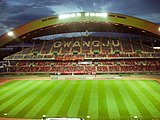
|
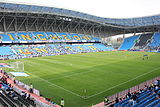
|

|

|
| Pohang Steelers | Seongnam FC | FC Seoul | Suwon Samsung Bluewings |
Suwon FC | Ulsan Hyundai |
| Pohang Steel Yard | Tancheon Stadium | Seoul World Cup Stadium | Suwon World Cup Stadium | Suwon Stadium | Ulsan Munsu Football Stadium |
| Capacity: 17,443 | Capacity: 16,146 | Capacity: 66,704 | Capacity: 44,031 | Capacity: 11,808 | Capacity: 44,102 |
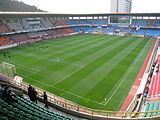
|
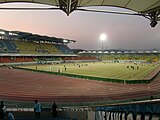
|
File:World cup stadium seoul.jpg | 
|

|
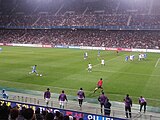
|
Foreign players
Restricting the number of foreign players strictly to five per team, including a slot for a player from the Asian Football Confederation countries and a slot for a player from the Association of Southeast Asian Nations. A team could use five foreign players on the field each game, including at least one player from the AFC confederation. ![]() Samuel Pungi, playing for Pohang Steelers, was deemed to be a native player as he had been granted South Korean nationality.
Samuel Pungi, playing for Pohang Steelers, was deemed to be a native player as he had been granted South Korean nationality.
The name in bold indicates that the player was registered during the mid-season transfer window.
League table
| Pos | Team | Pld | W | D | L | GF | GA | GD | Pts | Qualification or relegation[a] |
|---|---|---|---|---|---|---|---|---|---|---|
| 1 | Jeonbuk Hyundai Motors (C) | 38 | 22 | 10 | 6 | 71 | 37 | +34 | 76 | Qualification for Champions League group stage |
| 2 | Ulsan Hyundai | 38 | 21 | 11 | 6 | 64 | 41 | +23 | 74 | Qualification for Champions League play-off round |
| 3 | Daegu FC | 38 | 15 | 10 | 13 | 41 | 48 | −7 | 55 | |
| 4 | Jeju United | 38 | 13 | 15 | 10 | 52 | 44 | +8 | 54 | |
| 5 | Suwon FC | 38 | 14 | 9 | 15 | 53 | 57 | −4 | 51 | |
| 6 | Suwon Samsung Bluewings | 38 | 12 | 10 | 16 | 42 | 50 | −8 | 46 | |
| 7 | FC Seoul | 38 | 12 | 11 | 15 | 46 | 46 | 0 | 47 | |
| 8 | Incheon United | 38 | 12 | 11 | 15 | 38 | 45 | −7 | 47 | |
| 9 | Pohang Steelers | 38 | 12 | 10 | 16 | 41 | 45 | −4 | 46 | |
| 10 | Seongnam FC | 38 | 11 | 11 | 16 | 34 | 46 | −12 | 44 | |
| 11 | Gangwon FC (O) | 38 | 10 | 13 | 15 | 40 | 51 | −11 | 43 | Qualification for relegation play-offs |
| 12 | Gwangju FC (R) | 38 | 10 | 7 | 21 | 42 | 54 | −12 | 37 | Relegation to K League 2 |
Rules for classification: 1) Points; 2) Goals scored; 3) Goal difference; 4) Wins; 5) Head-to-head points
(C) Champions; (O) Play-off winners; (R) Relegated
Notes:
- ^ Teams played each other three times (33 matches), before the league was split into two groups, the top six and the bottom six.
Positions by matchday
Leader & AFC Champions League group stage
Qualification to AFC Champions League qualification play-offs
Relegation to the 2022 K League 2
Round 1-33
Round 34-38
Final rounds are from round 34 to round 38
Fixtures and results
Matches 1–22
Teams play each other twice, once at home, once away.
Matches 23–33
Teams will play each other at once.
Final Round Matches 34-38
Teams will play each other at once.
|
Final A
|
Final B
|
Season statistics
Top scorersMost assistsAwardsMost Valuable Player of The RoundMonthly AwardsSeason AwardsK League Most Valuable PlayerK League Young PlayerK League Top ScorerK League Top AssistorK League Best XIK League Manager of the YearSee alsoReferences
|

